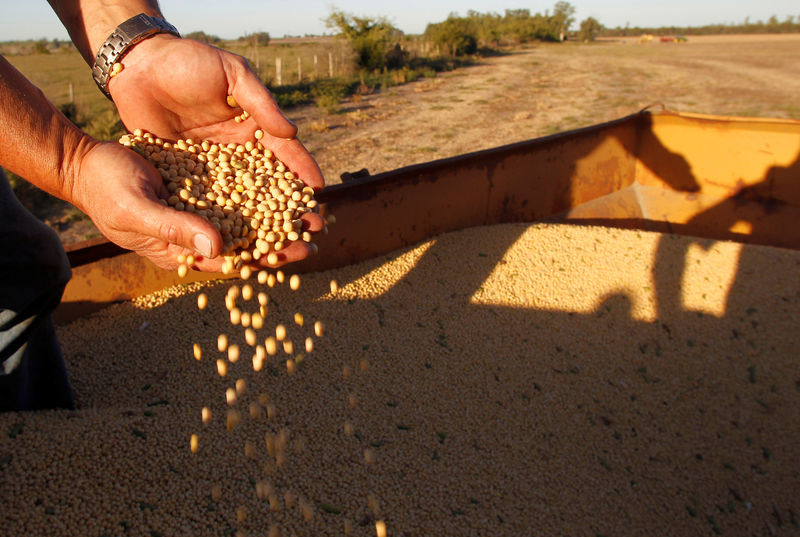By Karl Plume
CHICAGO, June 19 (Reuters) - U.S. crop and livestock prices tumbled on Tuesday, with soybean futures hitting lows not seen in nearly a decade, as U.S. President Donald Trump threatened more tariffs on $200 billion of Chinese goods, stoking fears the trade battle between the two economic giants would have a wider impact on the global economy.
Chicago Board of Trade soybeans 0#S: fell as much as 6 percent and wheat slumped 0#W: more than 4 percent. Corn 0#C: , cotton 0#CT: and ethanol 0#ZE: futures notched life-of-contract lows.
Chicago Mercantile Exchange lean hog contacts 0#LH: shed more than 2 percent of their value early on Tuesday. Live cattle futures 0#LC: at one point dropped 1 percent, led by Wall Street's retreat and a higher dollar that makes U.S. goods less attractive to foreign buyers.
Trump's threat followed his administration's announcement of tariffs on $50 billion of Chinese goods last week, which triggered retaliatory tariffs by Beijing on a slate of U.S. products, including soybeans and corn. U.S. exported $12.4 billion worth of soybeans to China last year, the single most valuable U.S. agricultural export product to its Asian rival.
Trade tensions between the world's top two economies have unnerved farmers and slammed agricultural markets on worries that China - the largest importer of U.S. soybeans, pork and cotton - would slow or halt purchases of those and other U.S. farm goods.
U.S. crop farmers have lost an estimated $100 per acre in revenue with the swift escalation in the trade spat over the past two weeks, the most rapid erosion of U.S. farm profit since at least 1979, according to Dan Basse, president of Chicago-based consultancy AgResource Co.
Net farm income was already projected to fall 6.7 percent to $59.5 billion in 2018, a 12-year low, according to the U.S. Agriculture Department. you get in a fight with your biggest buyer of agriculture, and the world's largest soybean buyer, even if (they) were to buy 20 percent less, it's a big deal," Basse said.
Concerns about tariffs are already disrupting global trade.
China, which imports about two-thirds of all soybeans traded globally, has not bought significant amounts of U.S. soybeans in three weeks. Traders fear that China will begin canceling the more than 3 million tonnes of U.S. soybeans that it has purchased but have yet to ship, valued at more than $1 billion.
The country has also not bought significant U.S. ethanol volumes for about six months, despite increased targets for its use there, amid the threat of tariffs on the corn-based biofuel. The U.S. ethanol industry has become more dependent on exports due to big domestic stockpiles.
"(China) has to be buying it from somewhere,” said a U.S. ethanol trader who asked not to be named because he was not authorized to speak to the media. "It isn't here."
The trade fight with China comes amid elevated trade tensions with several other top U.S. farm product importers, including Mexico and Canada, over Washington's tariffs on imported steel and aluminum.
The steep grain slump rippled across agricultural commodities markets, with prices for hogs and cattle, which normally benefit from cheap feed prices, also dropping.
Stock prices for U.S. grain merchants and meat processors were mixed.
Archer Daniels Midland Co ADM.N shares slipped 0.6 percent to $45.90, and CHS Inc CHSCP.O shares lost 0.8 percent to $29.73. Bunge Ltd's BG.N stock was up 1 percent at $71.81.
